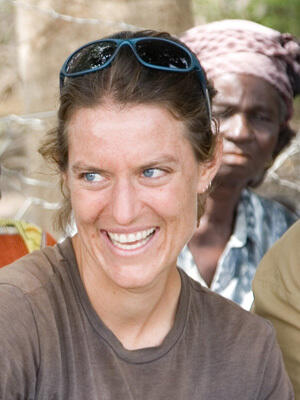Rural Health and Development at the Food-Water Nexus
Poverty stands prominently at the intersection of water scarcity, smallholder food production, and health in the world’s least developed regions. This project will measure the effects of poverty along the water-food-health nexus among rural households in Kenya, specifically, how differential access to domestic and productive water supplies, along with food security, and HIV and TB disease burden relate to changes in poverty over time among adults living in rural Kenyan households. Goals include measuring interactions between household productive and domestic water use, nutritional outcomes, infectious diseases, and poverty; and identifying local interventions and policy responses that are likely to have positive spillover effects in any of these domains.
CISAC Conference Room
Jenna Davis
473 Via Ortega, Y2E2, Room 255
Stanford, CA 94305-4020
Jennifer (“Jenna”) Davis is a Professor in the Department of Civil and Environmental Engineering and the Higgins-Magid Senior Fellow at the Woods Institute for the Environment, both of Stanford University. She also heads the Stanford Program on Water, Health & Development. Professor Davis’ research and teaching is focused at the interface of engineered water supply and sanitation systems and their users, particularly in developing countries. She has conducted field research in more than 20 countries, including most recently Zambia, Bangladesh, and Uganda.
Eran Bendavid
Encina Commons, Room 102,
615 Crothers Way,
Stanford, CA 94305-6019
My academic focus is on global health, health policy, infectious diseases, environmental changes, and population health. Our research primarily addresses how health policies and environmental changes affect health outcomes worldwide, with a special emphasis on population living in impoverished conditions.
Our recent publications in journals like Nature, Lancet, and JAMA Pediatrics include studies on the impact of tropical cyclones on population health and the dynamics of SARS-CoV-2 infectivity in children. These works are part of my broader effort to understand the health consequences of environmental and policy changes.
Collaborating with trainees and leading academics in global health, our group's research interests also involve analyzing the relationship between health aid policies and their effects on child health and family planning in sub-Saharan Africa. My research typically aims to inform policy decisions and deepen the understanding of complex health dynamics.
Current projects focus on the health and social effects of pollution and natural hazards, as well as the extended implications of war on health, particularly among children and women.
Specific projects we have ongoing include:
What do global warming and demographic shifts imply for the population exposure to extreme heat and extreme cold events?
What are the implications of tropical cyclones (hurricanes) on delivery of basic health services such as vaccinations in low-income contexts?
What effect do malaria control programs have on child mortality?
What is the evidence that foreign aid for health is good diplomacy?
How can we compare health inequalities across countries? Is health in the U.S. uniquely unequal?
Rosamond L. Naylor
The Jerry Yang and Akiko Yamazaki
Environment and Energy Building
Stanford University
473 Via Ortega, Office 363
Stanford, CA 94305
Rosamond Naylor is the William Wrigley Professor in Earth System Science, a Senior Fellow at Stanford Woods Institute and the Freeman Spogli Institute for International Studies, the founding Director at the Center on Food Security and the Environment, and Professor of Economics (by courtesy) at Stanford University. She received her B.A. in Economics and Environmental Studies from the University of Colorado, her M.Sc. in Economics from the London School of Economics, and her Ph.D. in applied economics from Stanford University. Her research focuses on policies and practices to improve global food security and protect the environment on land and at sea. She works with her students in many locations around the world. She has been involved in many field-level research projects around the world and has published widely on issues related to intensive crop production, aquaculture and livestock systems, biofuels, climate change, food price volatility, and food policy analysis. In addition to her many peer-reviewed papers, Naylor has published two books on her work: The Evolving Sphere of Food Security (Naylor, ed., 2014), and The Tropical Oil Crops Revolution: Food, Farmers, Fuels, and Forests (Byerlee, Falcon, and Naylor, 2017).
She is a Fellow of the Ecological Society of America, a Pew Marine Fellow, a Leopold Leadership Fellow, a Fellow of the Beijer Institute for Ecological Economics, a member of Sigma Xi, and the co-Chair of the Blue Food Assessment. Naylor serves as the President of the Board of Directors for Aspen Global Change Institute, is a member of the Scientific Advisory Committee for Oceana and is a member of the Forest Advisory Panel for Cargill. At Stanford, Naylor teaches courses on the World Food Economy, Human-Environment Interactions, and Food and Security.
Amy J. Pickering
Stanford Woods Institute for the Environment
473 Via Ortega
Stanford, CA 94305-4020
Amy Pickering is a research associate and lecturer at Stanford University. She received a BS in biological engineering at Cornell University, a MS in environmental engineering from the University of California, Berkeley and a PhD in interdisciplinary environment and resources at Stanford University. Her current research interests include understanding the relationship between water access, food security, sanitation and infectious disease in rural communities in Kenya, Bangladesh, and Mali.



